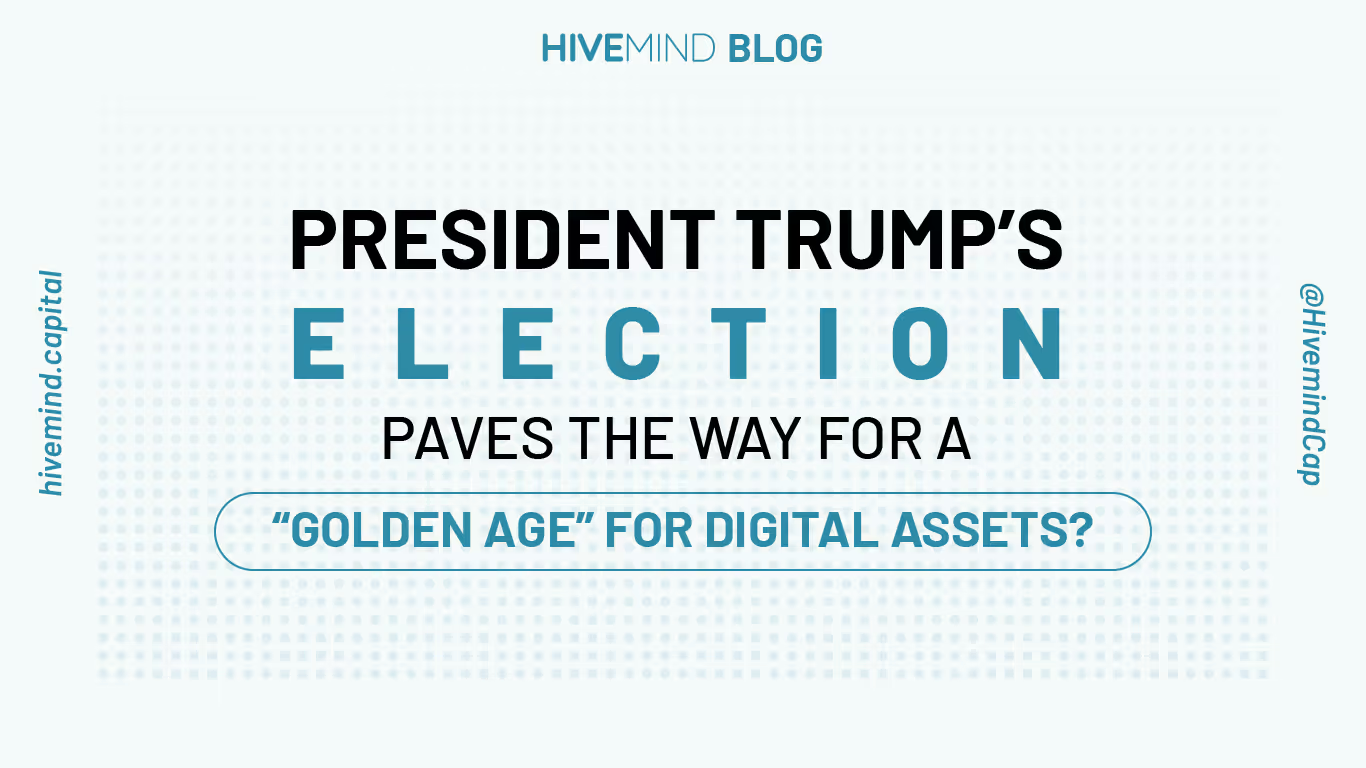
Articles
President Trump’s election paves the way for a “golden age” for digital assets?
Sayuri Ganesarajah
November 6, 2024
It is hard to deny that the digital assets sector has had a difficult few years. There has been a noticeable lack of clear answers to fundamental legal and regulatory questions in the U.S. jurisdiction, which must be addressed for the industry to truly thrive. Questions such as: (i) How should digital assets be defined and classified – is the Howey test really the most appropriate test for the digital age? (ii) Should DeFi protocols be subject to the same regulations as centralized exchanges? (iii) How can consumers be protected from fraud, market manipulation, and scams without compromising privacy rights?; and (iv) What is the framework for cross-border cooperation with respect to digital asset regulation?
Gary Gensler, Chair of the SEC, has insisted that the digital assets industry is a risk to investors, pointing to the collapse of FTX and other headline bankruptcies and scams. We can assume that most (if not all) believe that participants should be dealt with appropriately as per the law where there has been illegal activity. However, most in the digital assets sector do not agree with the SEC’s unprecedented response of seeking to regulate the sector by enforcement. Such action has not only delayed any regulatory advancement and clarity, but it has put key players such as Coinbase and Binance in a position such that they (and the entire industry) will only get answers to fundamental regulatory questions if participants have the money to litigate against the SEC. Regulatory guidance and clarity are the responsibility of the regulator – it is not designed to be a novelty obtained by a few that can afford to demand it.
The SEC’s regulatory action has been a persistent presence in the background of the Biden-Harris administration. In March 2022, the digital assets sector welcomed President Biden’s Executive Order on Ensuring Responsible Development of Digital Assets. The order laid out a comprehensive framework for how the U.S. government should approach digital assets, with four key priorities: (i) consumer and investor protection; (ii) financial stability; (iii) illegal activity; and (iv) innovation and competitiveness. However, since then, President Biden’s administration has either been muted or taken a relatively unfavorable stance in respect of digital assets, with President Biden notably defending the SEC's highly criticized Staff Accounting Bulletin No. 121 (SAB 121) earlier this year. In addition, Vice President Kamala Harris did not set out any agenda for digital assets, which had been criticized as an indication of her lack of support.
Given the landscape, it was difficult for the digital assets sector not to be dazzled by the first politician to lay out bold and direct plans for it: President-elect Donald Trump.
On July 7th of this year, the Republican Party unveiled a draft of its political program. Under its plan to “Champion Innovation” it states “Republicans will end Democrats' unlawful and unAmerican Crypto crackdown and oppose the creation of a Central Bank Digital Currency. We will defend the right to mine Bitcoin, and ensure every American has the right to self-custody of their Digital Assets, and transact free from Government Surveillance and Control.”
This statement followed with the first-ever presidential candidate in the US attending the 2024 Bitcoin Conference in Nashville on 27 July, where President-elect Donald Trump laid out his “plan to ensure that the United States will be the crypto capital of the planet and the Bitcoin superpower of the world”. He stated: “if bitcoin is going to the moon, as we say, it's going to the moon, I want America to be the nation that leads the way. And that's what's going to happen.”
He also said he would immediately appoint a Bitcoin and crypto Presidential Advisory Council. He explained that “their task will be to design transparent regulatory guidance for the benefit of the entire industry”. In addition, he laid out further plans to fire Gary Gensler from the SEC. President-elect Donald Trump also suggested that the US would maintain a Bitcoin strategic reserve and defended the right to self-custody, which is supported by Republican Senator Ted Budd, who introduced the Keep Your Coins Act in the Senate on November 7th 2023.
It would be unrealistic not to recognize that these are all campaign promises and no President - in the US or otherwise - has delivered on all their campaign promises. However, this is the first time the digital assets sector has had a President who has even attempted to make such promises. Coupled with: (i) his own family launching a DeFi project - World Liberty Financial - suggesting a genuine interest in this sector; (ii) a Republican majority in the Senate and on course for a majority in the House of Representatives, paving the way for a unified start to the possibility of new legislation; as well as (iii) a team of associates and advisors who have regularly expressed favorable positions on digital assets, namely Vice President-elect, JD Vance; Robert F Kennedy Jr; and Howard Lutnick, Chairman and CEO of Cantor Fitzgerald and BGC Partners, signifies that if progress is genuinely desired, everything is in place for that progress to now follow.
"As we say, it's going to the moon”
--

.svg)